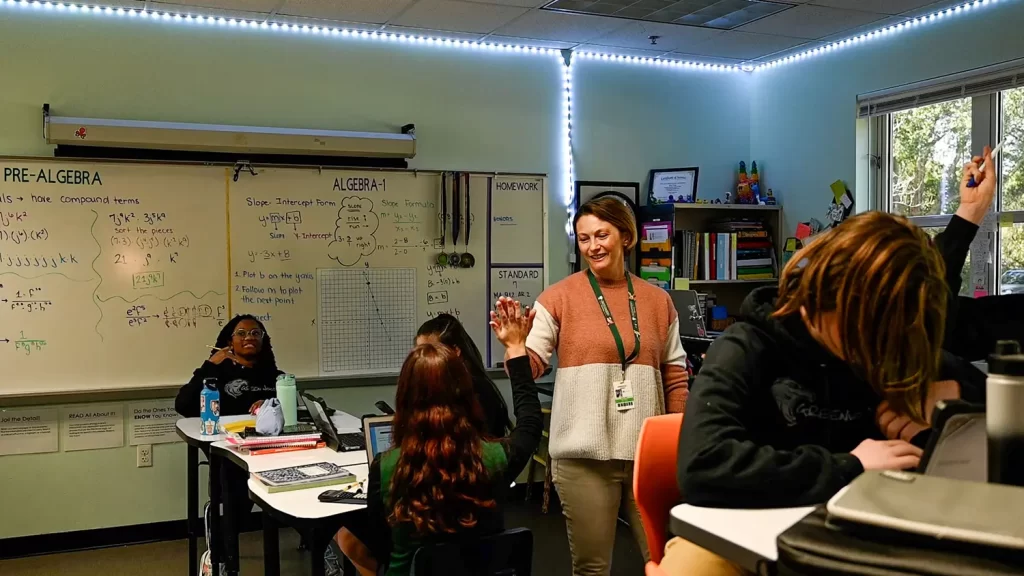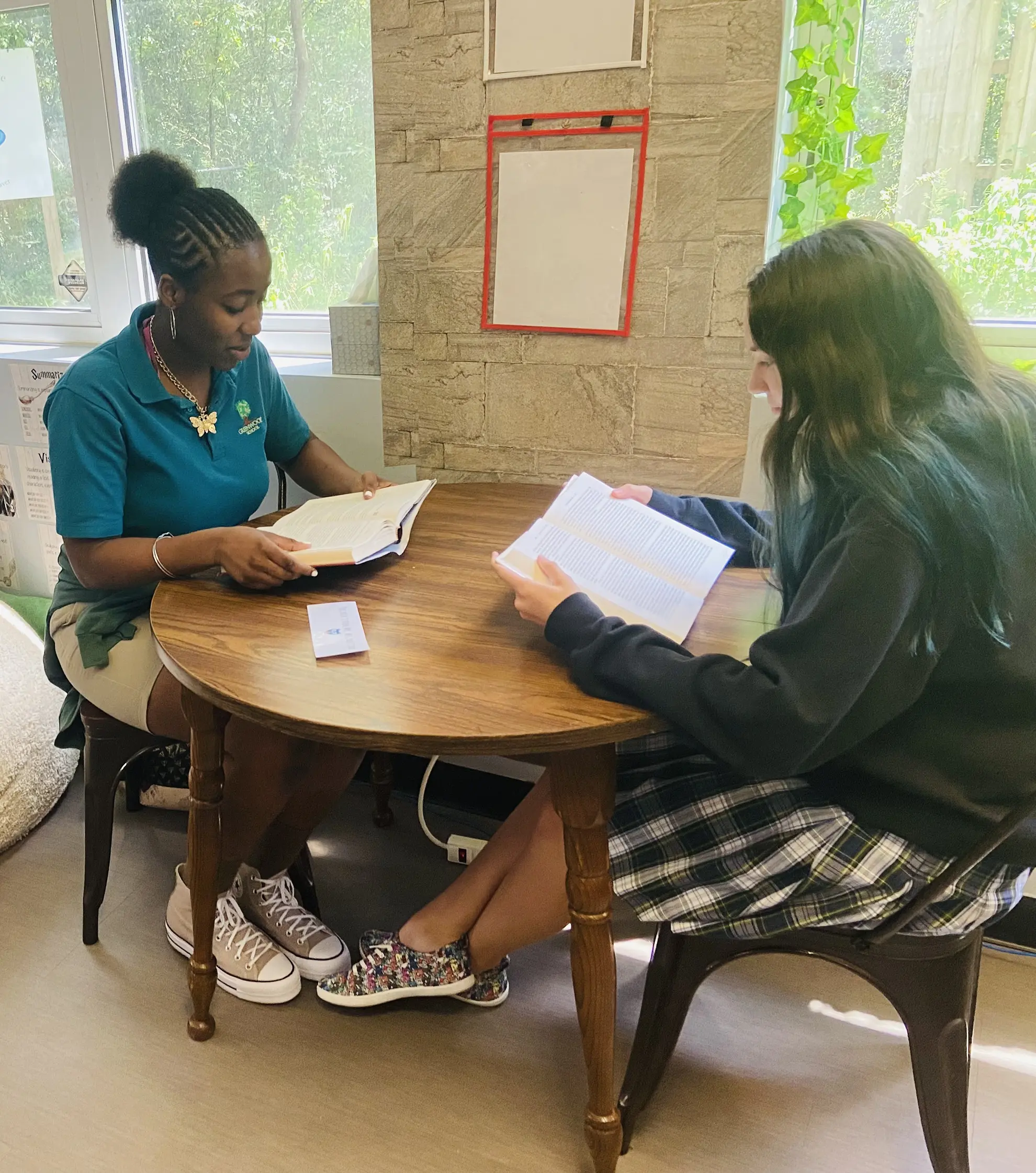Relationship-focused approach
Strengths-based instruction
Challenging curriculum with appropriate supports and accommodations
Physically and emotionally safe campus and classroom environment
Highly qualified, certified, caring faculty and staff

“In our ever-changing world of technology, there are many benefits from exposure to STEAM classes. To succeed in robotics takes a lot of patience; and the courage to not only make mistakes but to work through their mistakes; and improve crucial problem-solving skills. I have seen students stretch their creative muscles, pique their curiosity, and motivate them to build things that only they can imagine promoting the perfect learning environment for our students. . Exposing our students to computer science is a must for many workforce fields, and increasingly 3D printing, drones, and advanced machinery are becoming more and more common in various working environments. With this in mind, it is essential to introduce our students to as many different types of STEAM classes as possible.”
— Leslie Surowiec, STEAM/Robotics Teacher

Recent Greenwood graduates have attended a number of colleges including: Savannah College of Art and Design, University of North Florida, Jacksonville University, University of Alabama, and Flagler College.

Seventh grade students learn how to implement the skills they have been taught. These tools can help anyone who is planning, problem solving, or working on a goal.
Eighth grade students learn the resources, tools, and knowledge to make a successful transition from Middle School to High School. This will also lay the foundation so they can thrive in their future careers.
“Foundations in Personal Finance: High School Edition will change the financial future of your students and set them on a path to win with money, allowing you to change the way your students look at money forever. They will be empowered, equipped and entertained while building confidence in their own financial decision-making” (Ramsey, 2016).
This course uses Dave Ramsey’s Foundations in Personal Finance Curriculum. It includes video lectures with an interactive student workbook with fill in the blanks that correspond to the videos. The curriculum is filled with information that will empower students to make intelligent choices in regards to money and manage their personal finances successfully as they prepare to enter the “real” world on their own.
The primary content for the course pertains to the study of learning the ideas, concepts, knowledge and skills that will enable students to implement beneficial personal decision-making choices; to become wise, successful, and knowledgeable consumers, savers, investors, users of credit and money managers; and to be participating members of a global workforce and society.
Provides opportunities and resources for students to learn, understand, and reinforce concepts that will enhance their overall educational experience. Skills learned can also be transferred to life after high school. Areas of focus include graduation requirements, grade point average (G.P.A.), types of learning differences, note taking, volunteering, mindfulness, and executive functioning skills. Students will apply what they learn developing projects and activities.
Students are exposed to a wide variety of speaking situations, formal and informal. Focus will be on communicating with a purpose. Types of speaking may include informational, persuasive, demonstration, debate, mock trials, impromptu, sales, oral interpretation, symposium, mini TED talks, valedictorian, or other. Since public speaking is the number one fear of most Americans, the class provides a supportive and low-key atmosphere to help students overcome their anxiety.
This course is designed to introduce students to both career fields as well as college exploration. We will start with a focus on building up skills that are needed for both aspects of adult life: Decision-Making, Goal-Setting, Building Healthy Relationships, Anger Management and Effective Communication. Once we have built up these skills, we will introduce students to various categories of careers, and students will spend time researching different jobs in various career fields and reporting on them. They will also learn how to build resumes and interview for a job. In the second half of the term, we will focus on College Exploration. We will focus first on Scholarships, Grants and Financial Aid, including having students (Juniors and Seniors) sign up for the FASFA. We will talk about what is expected in a College Environment, and also look at Trade and Vocational Schools too. A large chunk of the exploration will be spent on researching different colleges around the country. Students will also revisit the skills they learned at the beginning of the year, and examine how they can apply them to a college setting, with a focus on independence.

Greenwood hosts regular athletic competitions against local private schools in Jacksonville. Our competitive teams are Girls Volleyball and Boys Basketball. We also have a cheerleading team and a co-ed intramural flag football team in the spring.
Each year Greenwood School’s Fine Arts Department puts on a whole school production. Past productions include The Little Mermaid (22-23) and The Addams Family (23-24). The Department has committed to two full scale productions for the 2024-2025 school year. Almost Maine will be performed in October 2024 and The Spelling Bee will be performed in April 2025.
High School students who participate will meet to share ideas and raise funds for school activities, social events, community projects and helping people in need.
Activities: Halloween Candy Grams, Valentine Candy Grams, involved in House Field Days, Prom, Valentine’s Day Event “Palentine’s Party”, Middle School Dance, Suicide Awareness and Breast Cancer Awareness pins, Thankful Tree, Coin drive for the teacher pie tied in with both field days, and winter dress down day
In NHS (high school) and NJHS (middle school), students learn and develop skills to become leaders in the school and their community.
Activities: recycling program, fundraisers, Earth Day event
